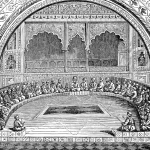I’m not really cut out, temperamentally, for hard-core activism. I vacillate too rapidly between empathy and rage, so I can’t really follow through on an attack; nor can I maintain a common ground very long, once having found it. Temperamentally I’m most inclined to hunker down on the farm, grow tomatoes, write poems, turn compost. But the same yearning for truth and a vision of the whole is what keeps me politically inclined: the things that happen on a broad scale matter. Ignoring them isn’t an option for me, even if paying attention makes me miserable.
I teach the classics of the Western canon, as well as modern literature. I’m teaching Dante right now, again, and am increasingly sympathetic to his idea that a poetic vision of a cosmos ordered in relation to “the love that moves the sun and the other stars” (‘L’amor che move il sole e l’altre stelle) must embrace also a political vision of a right ordering of things. In this respect, I am a conservative in the proper sense (though a Leftist one).
The idea that love could be connected with politics is strange at a time when our coming regime change has largely been driven by hatred. I’m referring not simply to the hatred of those who follow Trump in hopes that their evil dreams of supremacy will flower. I’m thinking of the fact that the intention of many voters was reducible to “stop X” – in some cases with moral legitimacy, yes, but it is troubling that we are left focusing less on what we love and wish to preserve or create, than on what we hate and intend to oppose.
Add to this hatred of the process itself, of the phenomenon of government: “I hate politics!” is a popular refrain (the implication being that we who attend to macro operations that will radically affect our lives are less virtuous). But to enter into the political process while hating it is strange. If you hate it, and have not bothered to attend to it, why engage in it? Doing so seems like an act of nihilism. And this would be nothing new. The history of humanity is the history of mindless self-destruction, maybe because of boredom, maybe because of the essential restlessness of the human heart.
And it is ironic that Trump’s campaign capitalized on hatred of government, while promising all the while to initiate big-government machinations. I wrote recently that I am taking the stance of Christian anarchy for the next four years, but this is not because I hate politics. It is politically meaningful to reject authoritarian regimes that one finds to be illegitimate.
But whatever stance one takes we are faced with the temptation of nihilism, to make our gestures those only of rejection and not of creation. And I say “creation” advisedly, because at times of disintegration and the abuse of power, we have to avoid idolatry to existing structures that do harm; we have to step outside of the existing circles that enclose us, and think creatively.
Back in the late nineties I gave a talk on Plato’s Republic as a work of poetry, arguing that the ironic critiques of art within the text have to be read in light of Plato’s other works, such as Phaedrus and Symposium, in which the role of beauty in exciting the passions, far from being a distraction, is needed in the philosophical life. The Utopian fantasies of Socrates and his friends, concocting the ideal polis, have long since been undermined not only by other texts but by actual attempts to produce utopias, that ended repeatedly in disaster.
Our literary trend is now dystopian, and the fact that so many teen and YA novels deal with dystopian scenarios indicates that the younger generation has achieved a cynicism still lacking in many of their elders. I find this hopeful, actually. Because behind the spectacle of dystopia is a recognition of a moral order against which we judge and weigh our civilizations. The Hunger Games especially undermines the narrative of utopia in that the revolutionaries end up being just as bad as those they rebel against (you look into the abyss; it looks back).
Now the point of emphasizing the Republic as a work of poetry is that it was not intended to be a blueprint for forging an actual perfect social order. It was intended to be a vision, an image of a truly just city, which would mirror and reflect the truly just soul. Entering into the task of building the Republic is a poetic, not a civic activity. As a civic activity, it is bound to be a failure, a power-conglomerate.
But here’s the key: the poem of the Republic is also political. It is political because it involves a group of people coming together and sharing their visions of what it means to be human – both the secret inner human, the soul, and the public interactive human, who engages in the affairs of the Republic. It is part of who we are as humans, to engage in these shared acts: we are political beings, whether we like it or not.
There will never be a need to stop writing dystopian satire (I have one planned myself) – but we need also to maintain a sense of the connection between the poetic and the political. That doesn’t mean, write only about politics, or only about big things and world events. We can write about very small things – insects and earthworms – while maintaining that allegorical sense of a search for a cosmic ordering.
We need poetry now more than ever, but not only as an escape or retreat: we need it also as an engagement. We need it to awaken our inner eyes to the light of the good that shines on all – l‘amor che move il sole e l’altre stelle.















